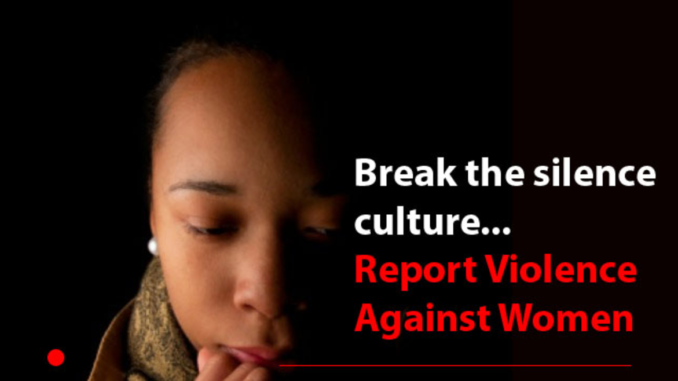
SOCIAL deviancy has become an indelible part of Nigerian society. In Lagos State, domestic violence features prominently on the long list of anti-social behaviour. The latest official report, which covers the early months of 2017, reflects a disturbing spectre of violence within family circles. In particular, violence by women on men spiked considerably in the past year. To exorcise the demon of domestic violence, the government at Alausa, its multilateral partners and the society at large have to wake up to the reality of implementing tough measures against these ills.
In all, 852 cases of domestic violence were recorded between January and the first week of September 2017, according to Adeniji Kazeem, the state’s Attorney-General and Commissioner for Justice. Lagos witnessed 564 cases of domestic violence, 60 cases of defilement, 11 attempted incidents of rape, 123 child neglect and abuse incidents and 84 miscellaneous cases. Data released by Kazeem, who also heads the Lagos State Domestic and Sexual Violence Response Team, revealed that more men were being exposed to spousal abuse. Only 14 men reported violence on them by their female partners in 2016. In contrast, the 2017 report shows a steep increase to 55 such cases. It is either women are getting more vicious or men are becoming bolder in stating their agony openly. Either way, it is a worrisome trend.
However, 95 per cent of the perpetrators of sexual violence against children and women are known to the victims, Kazeem said. It is not new, yet it is difficult to come to terms with the fact that family members, to wit fathers, uncles and cousins, as well as neighbours, are taking advantage of their close relationships with their victims to abuse them. Most of the sexual assault cases were committed in the afternoon during weekdays, apparently when parents and neighbours had gone to work, the report said.
Validation could be gleaned in a February 2017 case in which an artisan, Kingsley Philip, was arraigned in court for defiling his neighbour’s five-year-old daughter in his apartment in Idimu, Lagos. This is sickening. The Office of the Public Defender said it treated 1,143 cases of sexual defilement between 2007 and 2015.
Domestic violence, which experts describe as physical, emotional, verbal, sexual and financial abuse, is equally alarming. A host of married Nigerian celebrities have openly decried their maltreatment by their partners, causing them to part with those spouses, especially on account of battering. Many other married women are suffering in silence, afraid of rejection by the society, which sees divorce as a moral albatross. As a result, the hapless women, confronted by this irrationality, stay in abusive relationships.
Nevertheless, this could be fatal. In 2016, Ronke Shonde, 36, was allegedly pummelled to death by her husband, Lekan, now on trial for her murder. The mother of two reportedly endured repeated battering in their Egbeda, Lagos home, before the fatal incident that year. In another shocking spousal abuse incident that hogged the headlines, Akolade Arowolo was sentenced to death by hanging by a Lagos High Court for killing his wife, Titilayo, in their matrimonial home in Lagos in 2011. The prosecution testified that Akolade, who was said to have frequently abused his wife, stabbed her 76 times on the day she died.
An updated report published by the United Nations in 2016 estimated that 38 per cent of murders of women globally were committed by intimate male partners. The UN report says domestic violence “can negatively affect women’s physical, mental, sexual and reproductive health, and may cause increased vulnerability to HIV.” The risk factors for domestic violence include low education, child maltreatment or exposure to violence in the family, harmful use of alcohol and drugs, attitudes of accepting violence, and a culture of male entitlement or paternalism, according to the report.
Yet, the conviction rate for sexual violence is still too low to deter socially deviant behaviour, fuelled by weak laws and sentimentality. In mitigation, the Federal Government promulgated the Violence Against Persons (Prohibition) Act in 2015. The law re-defines and expands the scope of domestic violence, but implementation has not gained ground. On its part, the Lagos State Government has rolled out new measures to combat the scourge. Apart from its avowal to prosecute sexual violence offenders, it plans to establish a fund to cater for the needs of survivors of domestic violence and gives medical treatment to survivors. It is about to come out with a short message service code system dedicated to infractions. Since financial insecurity is one of the strong reasons women abide with violent partners, this will provide succour to them. The SMS portal, when operational, will be a veritable means of reporting cases of abuse by the victims and their neighbours or associates. These interventions should be entrenched and access given to all and sundry through a broad-based enlightenment programme, including the publication of pamphlets in both local languages and English on the matter.
Reining in domestic violence requires a multi-faceted approach from government agencies, civil society organisations, faith-based organisations and, most critically, parents. Experts advise parents to reduce the exposure of their children to domestic violence since children of such relationships often grow up to be abusive themselves. Parents should control the exposure of their children to violent TV movies and video games and encourage them to report abuse by neighbours, teachers and clerics. The justice system should be attuned to the new reality and dispense justice shorn of the technicalities that have allowed the perpetrators of domestic violence to extricate themselves from their comeuppance.
END

Be the first to comment